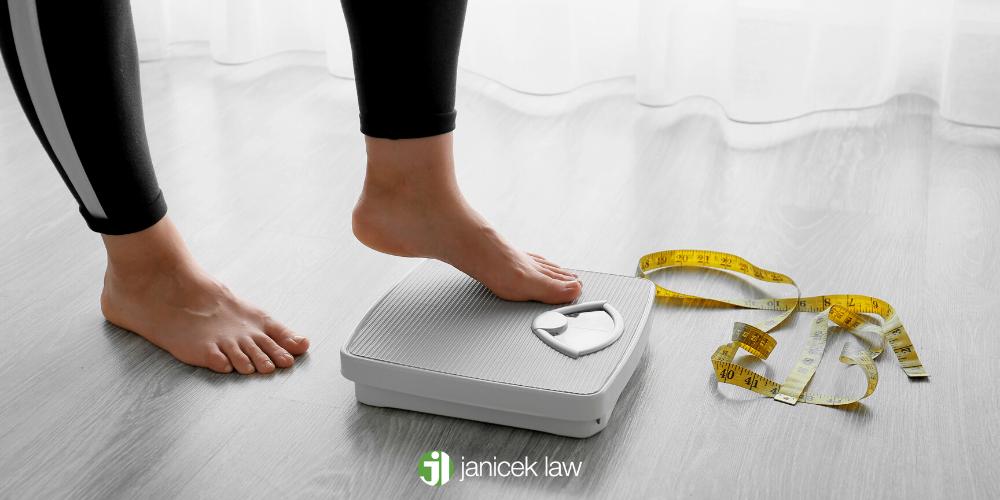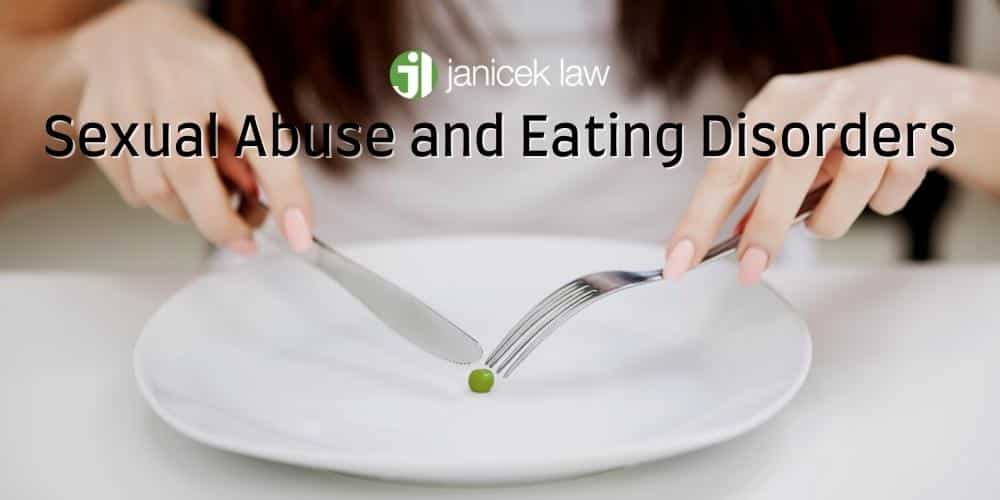While medical professionals are unsure of the exact cause of eating disorders, they know that childhood abuse (e.g. physical abuse, emotional abuse, sexual abuse, neglect) can play a huge role in this type of psychological issue. In fact, the link between sexual abuse and eating disorders is well documented in recent research. Sexual abuse isn’t a direct cause of an eating disorder, however, it is certainly a major risk factor. Eating disorders aren’t the only type of issue that sexual abuse survivors can develop. Survivors of sexual abuse can also develop PTSD, substance abuse, personality disorders, and so much more. Our legal team explains this and more below.
If you have suffered from both sexual abuse and eating disorders, you may have grounds to take legal action. San Antonio sexual abuse lawyers at Janicek Law understand how traumatizing sexual violence can be, especially when it’s committed by someone you trust like a therapist, a doctor, a teacher, a Boy Scout leader, or even a clergy member. We believe that all sexual abusers should be held accountable for the lifelong physical and emotional pain that they inflict onto their victims. Call us at 210-366-4949 to determine whether or not you have grounds to file a civil lawsuit.
What is Sexual Abuse?
Sexual abuse (AKA sexual assault) is an umbrella term that includes a wide variety of non-consensual sexual encounters or sexual acts committed upon a victim. Common types of sexual abuse include:
- Indecent exposure, which is when someone exposes their genitalia to another person without their consent.
- Taking, distributing, or showing sexually explicit content without someone’s consent.
- Any kind of unwanted sexual contact including molestation, groping, and fondling.
- Forced oral, vaginal, or anal penetration with any object or body part.
- Incest, which is any type of familial sexual activity.
- Forcing someone to perform sexual acts upon the abuser.
- Any kind of sexual contact with someone below the age of consent (age 16 to 18, depending on the state).
- Engaging in any kind of sexual contact while the victim is under the influence of drugs or alcohol.
- Sexual harassment which can include requests for sexual favors, unwanted sexual advances, sensual conversations/compliments, etc.
- Stealthing, which occurs when someone removes their condom during sexual intercourse without the victim’s consent.
- Voyeurism, which occurs when a person watches someone in their home or hotel room without their knowledge for the sake of sexual pleasure. Voyeurists commit this act by placing hidden cameras throughout a victim’s home or room.
Victims of childhood sexual abuse commonly suffer a wide range of physical and emotional issues for years following the initial event. That’s why so many victims choose to speak up and pursue justice through civil and/or criminal sexual abuse lawsuits. If you’re actively enduring physical and emotional pain from your case of child sexual abuse, the legal team at Janicek Law wants to help you pursue justice and financial compensation.
Mental Health Issues That Sexual Abuse Victims Can Suffer From
Tragically, victims of sexual violence can suffer from a wide variety of mental health issues, including:
- Post traumatic stress disorder (PTSD)
- Depression and/or anxiety disorder
- Substance abuse and addiction
- Self-harm
- Suicidal thoughts and desires
- Body image issues
- Generally low self esteem
- Somatic disorders
- Obsessive compulsive disorder (OCD)
- Personality disorders
- Schizophrenia
- Confusion about sexuality and/or gender
- Eating disorders
What is an Eating Disorder?
An eating disorder is characterized by abnormal food intake and constantly distressing thoughts and emotions about food, weight, and/or body image. Disordered eating can be incredibly dangerous and life-threatening without treatment. With proper treatment and support, though, sufferers can recover and live relatively normal lives.
Medical professionals are unsure of the exact cause of disordered eating. Many factors can lead to the development of eating disorders including traumatic experiences, poverty, neglect, body image issues, perfectionism, the influence of social media, growing up with parents who diet, childhood bullying, athleticism, and so much more.
How Many Americans Have Eating Disorders?
The National Eating Disorders Association (NEDA) estimates that 30 million Americans will suffer from disordered eating at some point in their lives. Women between the ages of 12 and 35 are most likely to suffer from an eating disorder according to the American Psychiatric Association. However, it’s not unheard of for men to struggle with an eating disorder as well.
Common Types of Eating Disorders
There are several types of eating disorders that people can suffer from. Below, we break down the most common types of eating disorders that afflict Americans.
Anorexia Nervosa
Anorexia nervosa is one of the most common types of eating disorders. It is also the most deadly. Anorexia is characterized by self-starvation in order to achieve a specific number on the scale or a specific clothing size. Anorexic adults generally have a body mass index (BMI) of under 18.5. The driving force behind anorexia is an intense fear of gaining weight.
Anorexic people may eat very small meals/low calorie foods, exercise obsessively, and/or consistently take laxatives. No matter how low the number on the scale gets, anorexic people generally still see themselves as too big. Therefore, they are almost never happy with the way they look even when they go to every possible dieting extreme.
There are two main subtypes of anorexia, including:
- Restricting: The anorexic person reaches their “goal weight” through only food restriction and/or excessive exercise.
- Binging and Purging: Anorexia sufferers are in a constant state of starvation. This can naturally lead to extreme periods of hunger in which they binge on the foods they have been restricting themselves from. After binging, the anorexic person feels incredible guilt and shame, which then leads them to purge either through vomiting or laxative misuse. This often leads to a regular cycle of starving, binging, and purging.
Anorexia nervosa sufferers can develop a wide range of serious health conditions including amenorrhea (absence of menstruation), hair loss, being cold all the time, dizziness and/or fainting, major gastrointestinal issues, osteoporosis/osteopenia, fatigue, muscle weakness/wasting, and death.
Bulimia Nervosa
Bulimia nervosa is characterized by a cycle of eating small meals with low calorie foods, then binging on large meals with high calorie foods, and finally purging through vomiting/laxative misuse. The purging is often a secretive, self-punishment act that’s accompanied by intense shame, guilt, and embarrassment after binging on a large meal. Similarly to anorexic people, bulimic people are very afraid of weight gain.
People who suffer from bulimia nervosa can be any weight or size. Most people with this type of eating disorder are at a normal, healthy weight. The American Psychiatric Association states that people who are underweight (BMI under 18.5) are more likely anorexic, not bulimic.
Because most bulimic people are at a normal weight and engage in secret purging, their loved ones may have no idea that they’re struggling with an eating disorder. A few common signs that someone may be suffering from bulimia include going to the bathroom right after meals, chronic sore throat, dental decay (from frequent purging), heartburn/acid reflux, large amounts of food disappearing from the pantry/fridge, and frequent dizziness/fainting spells.
Binge Eating Disorder
Binge eating disorder is similar to bulimia nervosa, minus the purging. People who engage in frequent binge eating (at least once a week for a minimum of 3 months) feel like they have no control over their eating habits, so they often eat far past fullness. Binge eating is often compared to emotional eating because it’s triggered by difficult emotions. Once the person is done binging, they generally experience lots of shame, guilt, and embarrassment, but they do not purge as a result.
People who suffer from binge eating disorder are typically overweight, obese, or morbidly obese. They may also suffer from other health problems like diabetes, heart diseases, high cholesterol, hypertension, etc.
Orthorexia Nervosa
While orthorexia nervosa is not officially recognized in the Diagnostic and Statistical Manual (DSM), it is becoming far more common, mostly due to the massive influence of social media.
This type of eating disorder is characterized by having an unhealthy obsession with healthy foods and supplements in order to achieve a specific weight or size. Orthorexic people have an intense fear of eating unhealthy foods that may cause weight gain. They may eat low calorie meals with an abundance of fruits/vegetables, excessively exercise, take an excessive amount of unnecessary dietary supplements in order to “detox,” constantly check ingredient labels, and cut out one or more food groups. Orthorexia can be very common among people who follow a strict vegan, vegetarian, or even ketogenic diet.
An extreme case of orthorexia nervosa can result in malnutrition, gastrointestinal issues, and even vitamin toxicity (from misuse of dietary supplements).
Avoidant Restrictive Food Intake Disorder (ARFID)
Avoidant restrictive food intake disorder (ARFID) is generally characterized by extreme picky eating, extreme anxiety about food/eating, and a struggle to meet nutritional needs. People may develop ARFID due to one or more of the following reasons:
- Lack of appetite and/or lack of interest in food
- Avoiding food due to appearance, texture, smell, color, etc.
- Extreme anxiety about food/eating which is generally caused by a negative event like food poisoning, choking on food, gastrointestinal issues, allergic reactions, etc.
In order to receive an ARFID diagnosis, the sufferer must experience drastic weight loss, major nutritional deficiencies, and an inability to eat with other people. Additionally, many ARFID sufferers need feeding tubes or dietary supplements in order to meet their nutritional needs.

How Many People With Eating Disorders Have Also Experienced Sexual Abuse?
There is definitely a connection between child sexual abuse and eating disorder behaviors. In fact, a recent study claims that approximately 30% of eating disorder patients were once victims of childhood sexual abuse. Most patients exhibited symptoms of binge eating disorder or bulimia nervosa.
The Connection Between Sexual Abuse and Eating Disorders
Traumatic experiences – like physical or sexual abuse – have been linked to eating disorders in recent research. It’s important to note that correlation does not equal causation, though. In other words, eating disorders are correlated with sexual abuse, but not necessarily caused by sexual abuse. Researchers have found that the emotional pain associated with childhood sexual abuse definitely creates a higher risk of developing an eating disorder at some point in life. But why?
Coping Mechanisms
The first reason why a sexual assault victim may develop disordered eating thoughts and behaviors is because food can be a coping mechanism for difficult emotions. For many survivors, food and eating can be viewed as a drug. When you’re sad, scared, overwhelmed, confused, or angry, food can serve as a temporary source of comfort and happiness. This comfort and happiness often comes crashing down the minute someone finishes binging. So it becomes a cycle: feel emotional pain, eat as a distraction/source of comfort, feel ashamed afterwards, repeat.
Negative Beliefs About Self and Self-Hatred
Many survivors of sexual violence have a deep-rooted hatred of themselves, or just negative beliefs about themselves in general. So they may hate their bodies because that’s what their sexual abusers did, or they may hate their bodies because of how disgusted the abuse made them feel. Therefore, they may turn to various forms of self-punishment, like starving, binging, purging, cutting, etc.
Control Issues
Being sexually abused means losing complete control over your own body. Even if the abuse was a one time event, the victim may spend the rest of their lives obsessively trying to regain control over their body by any means possible. This may turn into an obsession with controlling weight, calories, clothing size, and food in general.
Obsessively controlling any aspect of the body can feel liberating to a sexual assault survivor. They may feel like they are taking back the bodily control that was once stolen from them. But obsessively controlling food, weight, and calories is not a healthy thing. Eating disorders are one of many risk factors for chronic health conditions.
Trying to Be “Invisible”
Another reason why sexual assault victims often develop disordered eating habits is because they want to make themselves “invisible” to future abusers. They may want to make themselves as “unattractive” and “undesirable” to other people as possible. As a result, they may get really thin or really big. In this context, the eating disorder serves as a means of self-protection.
Can You Sue for Sexual Abuse?
Yes, you definitely file a civil lawsuit if you are a victim of sexual violence, and your sexual trauma greatly interferes with your day-to-day life. Developing an eating disorder is just one of many ways that sexual trauma can negatively impact someone’s life. Because research shows that sexual abuse can create numerous neurobiological changes in the brain, it’s very common for survivors to suffer with PTSD, substance abuse, and other psychological issues as well.
The wounds from sexual abuse are often viewed as “invisible,” but that doesn’t mean they are any less valid. Victims of sexual abuse deserve justice and financial compensation from the abuser and/or the institution that perpetuated the abuse. San Antonio sexual abuse lawyers at Janicek Law will produly stand by your side and help you fight for the justice you deserve.
Sexual Abuse Damages
If you endured sexual violence, a San Antonio sexual abuse lawyer can help you recover financial compensation for the following types of damages:
- Past and future medical expenses if you suffer from physical health issues related to your sexual trauma.
- Medical expenses associated with a psych ward hospitalization.
- Physical pain and suffering.
- Emotional distress and mental health disorders.
- Mental health counseling expenses.
- Lost wages if your sexual trauma has caused you to miss work.
- Loss of earning capacity if your sexual trauma/mental disorders prevent you from accomplishing all your job duties.
- Loss of consortium if your sexual trauma prevents you from having a normal, healthy relationship with your partner/spouse.

Call San Antonio Sexual Abuse Lawyers at Janicek Law Today
If you were sexually assaulted by a therapist, a clergy member, a doctor, a Boy Scout leader, or a teacher, you may have grounds to pursue legal action. San Antonio sexual abuse lawyers at Janicek Law can review the details of your case, help you determine whether you have grounds to file a civil lawsuit, and fight for justice and financial compensation on your behalf. Call 210-366-4949 to schedule a free consultation with our legal team today.

